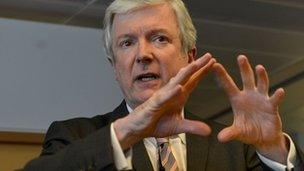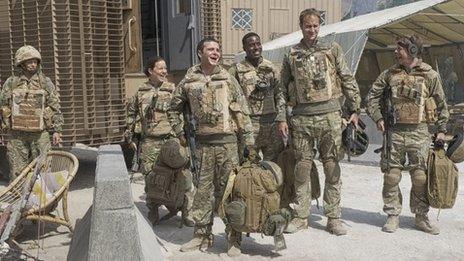Lord Hall: Closing BBC Three 'will save £50m'
- Published
Director general Tony Hall: "It's not the end of BBC Three, it is the beginning of a new BBC Three"
BBC Director General Tony Hall has confirmed he plans to close BBC Three from autumn 2015 and move its content online.
In an email to BBC staff, he explained the reasons behind the move.
Since I came back to the BBC I hope I've made two things clear.
First that the BBC is living with a licence fee that for five years will have been flat - it will not have gone up at all. And, at the same time, we are absorbing extra costs that we were asked to take on - for the World Service, S4C and the roll-out of broadband.

Lord Hall joined the BBC in April 2013, having previously run the Royal Opera House
That's why the organisation has had to look for savings - so that we, like everyone else in these difficult economic times, can live within our means. My concern - along with that of everybody I meet inside and outside the BBC - is to ensure that the quality of what we do is not compromised along the way.
We are here to produce exceptional and distinctive programmes and services for Britain and the world. But I do believe, as I said only last week, that the BBC has taken incremental change as far as it can. Something has to give. And that means hard choices. But there is one choice I will never make - and that's to sacrifice quality. And I believe that's what the British public thinks too.
The second point I've made is that the BBC is, by its nature and history, an organisation that constantly reinvents itself, an organisation that takes the idea of public service broadcasting - to inform, educate and entertain - and makes it relevant for each generation in our nearly one hundred year history.
I remember myself the launch of BBC News Online when I was running BBC News. There was a great deal of scepticism, to put it mildly. But we were doing what the BBC and its staff have always done - using our innate creativity to lead the way. That's why now - for this generation - I believe the iPlayer is a key part of the future for public service broadcasting. It's the gateway for people who increasingly want to watch and listen to what they want, when they want it - on tablets, on mobiles as well as other screens. I am sure that this is going to be increasingly important for our younger audiences. And reaching those audiences is vital for the BBC.

Lord Hall thanked BBC Three controller Zai Bennett for the channel's "extraordinary track record"
Reconciling these two aims - financial and strategic - has led us to this difficult conclusion. We should close BBC Three as a broadcast or linear channel and ask Danny and his team to reinvent it as a channel online and on the iPlayer. We propose making this change in the autumn of next year.
I believe it's the right thing to do: Young audiences - the BBC Three audience - are the most mobile and ready to move to an online world. 25% of viewing by 16-24 year olds is to catch-up or other screens and over the next few years we expect that to reach 40%. We recognise that, for now, most of this audience still do their viewing on television, and that is why we plan to show BBC Three's long-form content on either BBC One or BBC Two.
I'm convinced that the BBC as a creative organisation will be able to reinvent a space for young people on the iPlayer that will be bold, innovative and distinctive. It will not just be a TV channel distributed online - it will be an opportunity to look at new forms, formats, different durations, and more individualised and interactive content. It will play to BBC Three's strengths, offer something distinctive and new, and enhance the BBC's reputation with young audiences. And I will challenge everyone in the BBC to spend much more time focusing on programming for young audiences. We will lead the way.
Let me just say to Zai [Bennett, BBC Three's controller] and the BBC Three team: You produce, and will continue to produce, amazing programmes - bringing new ideas, new stories and new talent to our screens. BBC Three has an extraordinary track record - it's been home to Gavin and Stacey, Little Britain, Bad Education and, right now, Bluestone 42.
I've also been seriously impressed by the current affairs I've seen - from Blood, Sweat and T-Shirts and Our War, to Reggie Yates's outstanding reports from South Africa, ending just this week. You can be rightly proud of what you have achieved so far. I want you to carry on making programmes for young audiences that continue to break new ground.

Bluestone 42, about a British bomb disposal detachment in Afghanistan, has been a recent success for BBC Three
This is the first time in the BBC's history that we are proposing to close a television channel. I can't rule out it being the last change to our programmes or services. It will save the BBC over £50 million a year. £30 million of that will go into drama on BBC One. And it also means we will extend Children's programmes by an hour a night and provide a BBC One +1 channel. I must stress - all of this is what we are proposing to the BBC Trust. They will have the final say.
I am certain that this decision is strategically right - but it's also financially necessary too. Delivering the savings programme following the last licence fee negotiation means these changes are happening earlier than they might in a better financial environment. And I don't simply want to keep salami slicing the budgets in a way that means our frontline staff are always asked to keep doing more with less.
I am sure that we will have to face up to further difficult challenges as we build the BBC for the future. But in making those changes, I am determined to ensure we embrace the new opportunities technology gives us - and match that with programming of the highest quality that is simply the best in the world.
- Published6 March 2014
- Published5 March 2014
- Published5 March 2014